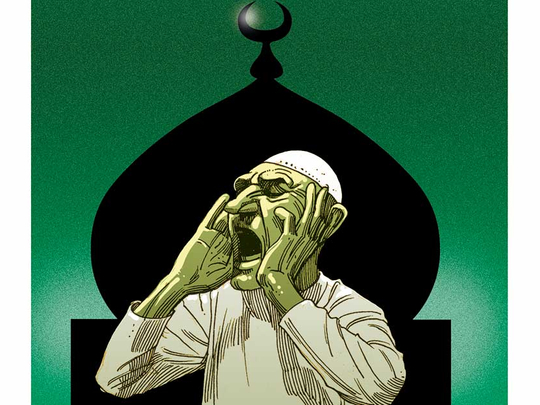
Members of the Israeli Knesset should wake up and smell the coffee. They should know Israel is not an exclusively Jewish state; it is a state with a very large Arab population. Leaving aside the fact it can legitimately be called an occupation entity, Israel must respect its multi-ethnic, multi-racial and multi-religious character. That includes respecting Islam, all of its rituals and all of its commandments. Its no use whining about the Athan, the call to prayer from the minarets, as disturbing Jewish sleep.
If the Jews insist on having their state amidst indigenous Arab populations, who are culturally and religiously different from them, Jews, their politicians and ministers, have to accept the situation lock, stock and barrel. It is no good hiding behind the introduction of man-made laws, regulations and tinkering under their legislature, police and army as if this makes it all right, to quash the rights of others to freedom of worship. The more they do that, the more unnatural they make themselves appear to be.
The bill to silence the Muslim prayer call, which has had its first reading in the Knesset, recently, is an atrocious, pernicious, odious piece of legislation that must be fought tooth and nail. This is because it goes to the very heart of Islamic percepts and teachings of which the prayer call is one of the most crucial element. It’s seen by many, including Jews themselves, as an onslaught on Islam and a very dangerous move to alter Israel’s Arab population, which is 1.4 million-strong — the great majority of which, around 85 per cent, are Muslims.
Save from Prime Minister Benjamin Netanyahu and the majority of Likud who supports the bill, there are a fair number of Israeli politicians who are against it such as Tzipi Livni, the former Israeli foreign minister. She argued the “Muezzin bill” would “destroy the ties between Jews and Arabs”.
She reflects the undeclared anguish that Israelis really feel. The vote on the reading, the first of three before it becomes law, was very close at 55 for the bill to 48 against. It means there is a clear division among Jews themselves about this legislation and it marks a very dangerous course that the Israeli right-wing is steering Israel into. The right-wing has itself become trapped on this issue of how to silence the prayer call.
The first bill was to silence all places of worship (read mosques). Then when the heat was turned on from Arab members of parliament in the Knesset and protests erupted on the streets throughout Israel, the bill’s tempo was turned down. This new reading, which is still a mishmashed variety, has resulted in total confusion. An initial total ban on outside public speakers ended in a “watered down” draft law that sought to silence “loudspeakers” between 11pm and 7am.
This was done not because of Israel’s good neighbourly intentions, but to exclude the start and end of the Jewish Sabbath that requires the blaring of sirens. It’s OK for Muslims to miss the early-morning prayer call, the first of five daily, but not for the Jewish Sabbath. You can’t divide Islam into pigeon holes, saying “this goes because it doesn’t suit our temperament, but we are prepared to live with it; and this doesn’t because it disturbs our sleep”. This is just a muddled way of thinking, which fuels tension and disturbs the uneasy peace between Arabs and Jews.
In the words of Knesset Arab MP Jamal Zahalka: “What disturbs the supporters of this legislation is not the noise [echoes from public speakers], but rather the sounds of the muezzin reminds them [Jews] of the true identity of this land.”
The bill is confused in other respects as well. There are those who say the nature of the bill is yet to be integrated in the Knesset Committee stage and what has been voted on by the Knesset were two bills with the same showing of hands, less one against. The muddle increases because one of the bills to be integrated is an amendment to the 1961 Nuisance Law that deals with outside decibel.
The Knesset has got itself into a real tangle this time, a quagmire of squabbles with those for the bill saying it is designed to untangle the “unsocial” sensibilities of Israelis.
It’s a good thing that Al Aqsa Mosque won’t come under the law in theory, so the Athan can continue to be heard because of a clause in one of the bills stating that the prayer call can be heard, if there are no Jewish colonists in the vicinity. But this may still be changed by Jewish MPs in the second or third reading. In any case, the danger is still on because the new bill will certainly apply to other parts of occupied East Jerusalem — home to 300,000 Palestinians at least.
It is no doubt these are very hard times for Palestinians. Their religion and culture are now under attack from the very state they are citizens of. But the Arab-Jewish equation will continue regardless.
The bill, then and now, has united Arab communities, both Muslims and Christians. The Athan was being echoed for the first time in churches in occupied Jerusalem, Nazareth and elsewhere in Palestinian conurbations with majority Christian populations showing the strength of Arab Palestinian solidarity.
It is no doubt the bill will continue to have a stormy run and it will be up to the Arab population to make Israeli politicians think multiple times before they go ahead and introduce such a damning law. For that to happen, the Arab and Islamic world must register greater protests and build greater support around the globe in the coming weeks and months.
Marwan Asmar is a commentator based in Amman. He has long worked in journalism and has a Phd in Political Science from Leeds University in the UK.









